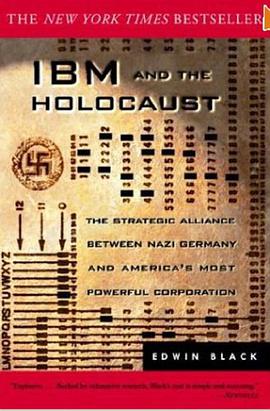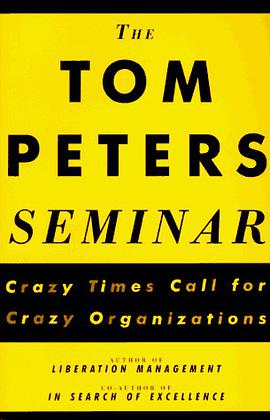
具体描述
Book Description
Published to extraordinary praise, this provocative international bestseller details the story of IBM’s strategic alliance with Nazi Germany. IBM and the Holocaust provides a chilling investigation into corporate complicity, and the atrocities witnessed raise startling questions that throw IBM’s wartime ethics into serious doubt. Edwin Black’s monumental research exposes how IBM and its subsidiaries helped create enabling technologies for the Nazis, step-by-step, from the identification and cataloging programs of the 1930s to the selections of the 1940s. With a new afterword, the publishing event of last year is certain to generate even more controversy.
Amazon.com
Was IBM, "The Solutions Company," partly responsible for the Final Solution? That's the question raised by Edwin Black's IBM and the Holocaust, the most controversial book on the subject since Daniel Jonah Goldhagen's Hitler's Willing Executioners. Black, a son of Holocaust survivors, is less tendentiously simplistic than Goldhagen, but his thesis is no less provocative: he argues that IBM founder Thomas Watson deserved the Merit Cross (Germany's second-highest honor) awarded him by Hitler, his second-biggest customer on earth. "IBM, primarily through its German subsidiary, made Hitler's program of Jewish destruction a technologic mission the company pursued with chilling success," writes Black. "IBM had almost single-handedly brought modern warfare into the information age [and] virtually put the 'blitz' in the krieg."
The crucial technology was a precursor to the computer, the IBM Hollerith punch card machine, which Black glimpsed on exhibit at the U.S. Holocaust Museum, inspiring his five-year, top-secret book project. The Hollerith was used to tabulate and alphabetize census data. Black says the Hollerith and its punch card data ("hole 3 signified homosexual ... hole 8 designated a Jew") was indispensable in rounding up prisoners, keeping the trains fully packed and on time, tallying the deaths, and organizing the entire war effort. Hitler's regime was fantastically, suicidally chaotic; could IBM have been the cause of its sole competence: mass-murdering civilians? Better scholars than I must sift through and appraise Black's mountainous evidence, but clearly the assessment is overdue.
The moral argument turns on one question: How much did IBM New York know about IBM Germany's work, and when? Black documents a scary game of brinksmanship orchestrated by IBM chief Watson, who walked a fine line between enraging U.S. officials and infuriating Hitler. He shamefully delayed returning the Nazi medal until forced to--and when he did return it, the Nazis almost kicked IBM and its crucial machines out of Germany. (Hitler was prone to self-defeating decisions, as demonstrated in How Hitler Could Have Won World War II.)
Black has created a must-read work of history. But it's also a fascinating business book examining the colliding influences of personality, morality, and cold strategic calculation.
--Tim Appelo
From Booklist
The publisher has ordered a print run of 100,000 copies, indicating that they expect high demand for this contentious expose. The author asserts that a collusion existed between IBM Corporation and the government of the Third Reich, wherein IBM supplied the technology enabling Nazi authorities to systematize their persecution of European Jews. Expect much discussion in the press and on the street about this very controversial book.
Brad Hooper
Inside Flap Copy
IBM and the Holocaust is the stunning story of IBM's strategic alliance with Nazi Germany ? beginning in 1933 in the first weeks that Hitler came to power and continuing well into World War II. As the Third Reich embarked upon its plan of conquest and genocide, IBM and its subsidiaries helped create enabling technologies, step-by-step, from the identification and cataloging programs of the 1930s to the selections of the 1940s.
Only after Jews were identified ? a massive and complex task that Hitler wanted done immediately ? could they be targeted for efficient asset confiscation, ghettoization, deportation, enslaved labor, and, ultimately, annihilation. It was a cross-tabulation and organizational challenge so monumental, it called for a computer. Of course, in the 1930s no computer existed.
But IBM's Hollerith punch card technology did exist. Aided by the company's custom-designed and constantly updated Hollerith systems, Hitler was able to automate his persecution of the Jews. Historians have always been amazed at the speed and accuracy with which the Nazis were able to identify and locate European Jewry. Until now, the pieces of this puzzle have never been fully assembled. The fact is, IBM technology was used to organize nearly everything in Germany and then Nazi Europe, from the identification of the Jews in censuses, registrations, and ancestral tracing programs to the running of railroads and organizing of concentration camp slave labor.
IBM and its German subsidiary custom-designed complex solutions, one by one, anticipating the Reich's needs. They did not merely sell the machines and walk away. Instead, IBM leased these machines for high fees and became the sole source of the billions of punch cards Hitler needed.
IBM and the Holocaust takes you through the carefully crafted corporate collusion with the Third Reich, as well as the structured deniability of oral agreements, undated letters, and the Geneva intermediaries ? all undertaken as the newspapers blazed with accounts of persecution and destruction.
Just as compelling is the human drama of one of our century's greatest minds, IBM founder Thomas Watson, who cooperated with the Nazis for the sake of profit.
Only with IBM's technologic assistance was Hitler able to achieve the staggering numbers of the Holocaust. Edwin Black has now uncovered one of the last great mysteries of Germany's war against the Jews ? how did Hitler get the names?
Book Dimension :
length: (cm)23.3 width:(cm)15.6
作者简介
埃德温·布莱克(Edwin Black)
‧ 16次普利策奖提名作家
‧《纽约时报》调查记者、畅销书作家
‧ 纪录片和好莱坞电影的内容提供者
为找寻纳粹如何获取了他父母的身份信息,美籍犹太记者埃德温·布莱克受美国大屠杀纪念馆一台霍尔瑞斯机器的指引,开始在世界范围内调查IBM与纳粹的关联。很快,埋藏几十年的罪证被他一一串联起来。
布莱克主要研究大屠杀、公司的罪行和贪污现象、政府的失职、学术造假和历史等。他的获奖畅销作品包括《反弱者战争》、《纳粹联结》、《转让协议》)等,在100多个国家以20种语言出版了200个版本。他已获16次普利策奖提名,曾接受奥普拉·温弗瑞、CNN、今日秀、NBC Dateline等知名节目的专访。近几年,他又获得了一系列卓越编辑奖。此外,他的作品经常被改编为纪录片,另有多部著作的电影版权已被好莱坞买断,其中一部即《IBM与纳粹》。
目录信息
读后感
大屠杀为什么会发生?它是如何在短时间内大规模发生的?受害者为什么会被精确识别? IBM为何与纳粹联盟,这背后究竟是人权政治下的歪曲滥用,还是投机净集中的利益博弈? IBM先进技术是如何传入欧洲的?冻结的资金又靠什么方式从欧洲德占区转出?是怎样一种契机让美国国务院成...
评分 评分 评分用户评价
神奇
评分神奇
评分神奇
评分神奇
评分神奇
相关图书
本站所有内容均为互联网搜索引擎提供的公开搜索信息,本站不存储任何数据与内容,任何内容与数据均与本站无关,如有需要请联系相关搜索引擎包括但不限于百度,google,bing,sogou 等
© 2025 qciss.net All Rights Reserved. 小哈图书下载中心 版权所有





















